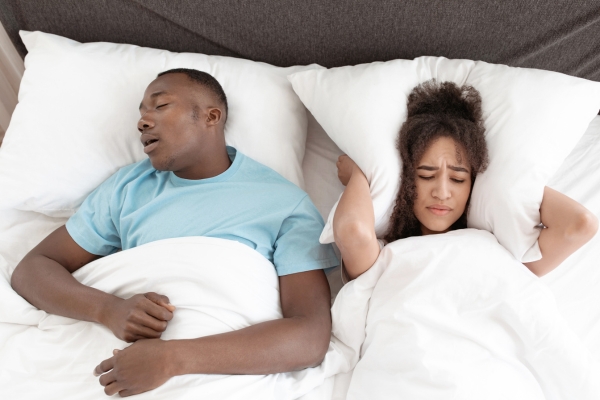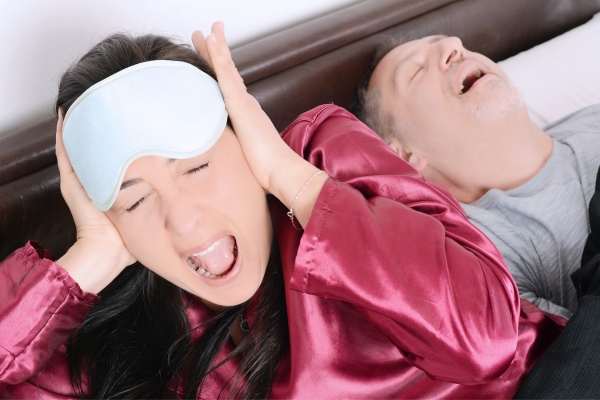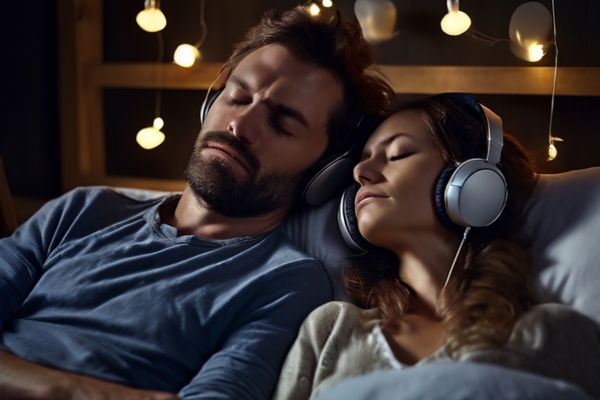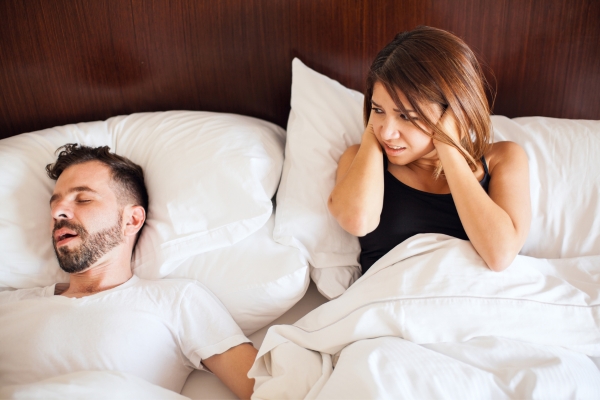Snoring can disrupt a good night’s sleep, not just for the snorer but also for those within earshot. While earplugs are a common solution, they’re not the only way to achieve peaceful slumber.
This article delves into alternative methods for blocking out snoring without resorting to earplugs, offering practical tips and strategies to help you and your partner enjoy uninterrupted rest.
Key Takeaways
- Understanding the mechanics of snoring is crucial for exploring effective alternatives to earplugs.
- White noise machines, soundproofing, and headphones with sound apps can serve as sound-blocking strategies.
- Lifestyle adjustments, including sleep position, diet, and exercise, can mitigate snoring intensity.
- Open communication with a snoring partner is essential for finding collaborative solutions to improve sleep quality.
- Seeking medical advice and exploring anti-snoring devices may provide long-term relief for chronic snorers.
Understanding the Mechanics of Snoring
The Science Behind Snoring
Snoring is a common condition that affects many individuals and their partners. Snoring occurs when the flow of air through the mouth and nose is partially obstructed during sleep. This obstruction can be due to various factors, including the anatomy of the mouth and throat, obesity, and the relaxation of muscles during sleep.
The intensity of snoring can vary from person to person, with some experiencing a soft, fluttering sound, while others may produce a loud and disruptive noise. The loudness of snoring is not only a source of annoyance but can also be indicative of underlying health conditions, such as obstructive sleep apnea.
While snoring itself is not harmful, it can be a symptom of more serious health issues and significantly affect the quality of sleep for both the snorer and their partner.
Understanding the causes and treatments of snoring is essential for finding effective solutions. Lifestyle changes, medical interventions, and alternative methods to earplugs can all play a role in reducing or eliminating snoring.
Why Earplugs May Not Be the Ultimate Solution
While earplugs are a popular choice for blocking out snoring, they may not be the best solution for everyone. Earplugs can reduce ambient sound and snoring by a significant amount, but they come with their own set of challenges. For instance, some users find earplugs uncomfortable for long periods, leading to irritation or a feeling of fullness in the ears.
- Reusable earplugs, though eco-friendly and cost-effective, require regular cleaning which can be inconvenient.
- Wax and foam earplugs may cause discomfort or pressure, and need frequent replacement to maintain effectiveness.
- Earplugs can lead to earwax buildup, potentially causing temporary hearing loss and requiring medical intervention.
It’s important to consider the individual fit and comfort, as well as the maintenance and hygiene associated with using earplugs. Not all earplugs are created equal, and what works for one person may not suit another. Exploring alternative methods to block out snoring can provide relief without the drawbacks of earplugs.
Evaluating Alternative Methods to Earplugs
When considering how to block out snoring without the use of earplugs, it’s essential to explore various alternatives that can be just as effective, if not more so. The key is to find a solution that suits your personal comfort and sleep habits.
- White Noise Machines: These can mask the sound of snoring with a consistent ambient sound.
- Soundproofing: Adding materials to walls or windows can dampen the noise entering the bedroom.
- Headphones and Apps: Certain headphones are designed for sleep and can be paired with apps to play soothing sounds.
- Lifestyle Changes: Adjusting sleep positions or improving health can reduce snoring at the source.
While earplugs are a common solution, they are not the only option. Alternative methods can offer a more personalized and potentially more comfortable night’s sleep.
Each alternative comes with its own set of pros and cons. It’s important to weigh these against your own needs. For instance, white noise machines are a non-invasive option, but may not be suitable for those who prefer complete silence. Soundproofing requires an initial investment but can be highly effective in the long term.
Headphones paired with apps offer a high-tech solution, but may not be comfortable for all sleepers. Lastly, lifestyle changes are cost-free and can improve overall health, but require commitment and time to see results.
Alternative Sound Blocking Strategies
Using White Noise Machines for Ambient Sound
White noise machines are a popular choice for those seeking to block out snoring without resorting to earplugs. These devices produce a consistent ambient sound, often compared to rushing water or radio static, which can mask disruptive noises such as snoring. The effectiveness of white noise machines can vary based on the individual’s sensitivity to sound and the frequency of the snoring.
When considering a white noise machine, it’s important to choose one that offers a variety of sounds and volume settings to cater to personal preferences. Some machines also feature pink noise, which is similar to white noise but with a softer, more soothing quality that many find conducive to sleep.
For those interested in specific product recommendations, a recent review titled ‘The 4 Best White Noise Machines of 2024‘ by Wirecutter highlights several options:
- Our pick: LectroFan EVO – praised for its variety of sounds
- Also great: Yogasleep Dohm – known for its real fan sounds
- Upgrade pick: Sound+ – offers advanced features
Each option comes with different price points and features, allowing users to find the best fit for their needs. Additionally, the SoundOff Noise Masking Earbuds are an alternative for those who prefer earbuds, playing non-looping pink noise to help you sleep.
The Role of Soundproofing and Room Modifications
While earplugs are a common solution for blocking out snoring and other nighttime noises, there are other strategies that can be equally effective. Soundproofing your bedroom can significantly reduce the intrusion of unwanted sounds, creating a more serene sleep environment. This can involve adding soft materials like thick curtains or plush carpets, which absorb sound and prevent it from bouncing around the room.
For those dealing with external noise, such as traffic or noisy neighbors, soundproof curtains can be an invaluable investment. These specially designed curtains are made to block out sound from outside, providing a quieter space for sleep. Additionally, sealing gaps around doors and windows can prevent noise from seeping into the bedroom.
While not a replacement for professional soundproofing, these room modifications can make a noticeable difference in reducing noise levels and improving sleep quality.
Here are some practical steps to consider for soundproofing your bedroom:
- Install soundproof curtains or heavy drapes to dampen external noise.
- Use thick rugs or carpets to absorb sound within the room.
- Seal gaps around windows and doors to prevent sound leaks.
- Consider adding acoustic panels or foam to walls for additional sound absorption.
Headphones and Sound Apps: A Modern Approach
In the quest to block out snoring without earplugs, headphones and sound apps represent a modern solution that can be tailored to individual preferences. Sleep headphones come in various designs, some fitting inside the ear, while others rest outside. For those who prefer not to have anything in their ears, sleep masks and pillows with built-in speakers offer an alternative.
Sound apps provide a plethora of auditory options to help drown out snoring. Users can choose from a range of sounds including music, meditations, nature sounds, and sleep stories. These apps can be used alone or in conjunction with headphones to create a personalized sleep environment.
The convenience of sound apps and the comfort of specially designed headphones can significantly improve sleep quality for those affected by snoring.
Here’s a quick look at some popular features of sleep headphones and sound apps:
- No need to fuss with apps in the middle of the night
- Easy on/off and volume control directly on the earbuds
- Availability of soothing sounds like proprietary Pink Noise
- Comfortable designs with flexible ear hoops
- Travel-friendly options with easy setup
- Long battery life for uninterrupted use
The SoundOff Noise Masking Earbuds, for example, offer a 30-night satisfaction guarantee and a 1-year warranty, ensuring that customers can try the product risk-free and have peace of mind regarding its quality.
Lifestyle Adjustments to Mitigate Snoring
Sleep Position and Pillow Choices
The way we position ourselves in bed and the type of pillows we use can have a significant impact on the quality of our sleep, especially when dealing with a snoring partner. Adjusting sleep positions and optimizing pillow choices may reduce snoring by promoting better breathing patterns and aligning the airways.
- Back Sleepers: Elevating the head can help reduce snoring by opening up nasal passages. Consider a pillow that provides enough support to maintain the natural curve of the neck.
- Side Sleepers: A firm pillow between the knees can align the hips and reduce stress on the lower back. Additionally, side sleeping is less likely to result in snoring compared to back sleeping.
- Stomach Sleepers: Generally not recommended due to potential neck strain, but a thin pillow or no pillow can minimize snoring for those who prefer this position.
While earplugs can be a quick fix, they may not address the root cause of snoring. Exploring different sleep positions and investing in the right pillows can lead to a more permanent solution, enhancing sleep quality for both you and your partner.
Remember, what works for one person may not work for another. It’s important to experiment with different positions and pillow types to find the most comfortable and effective arrangement for you.
Diet and Exercise’s Impact on Snoring
The connection between one’s diet, exercise habits, and snoring is often underestimated. A diet high in processed foods and low in nutrients can exacerbate snoring by contributing to inflammation and congestion in the airways. Conversely, a balanced diet rich in fruits, vegetables, and lean proteins can help reduce inflammation and improve overall respiratory health.
Regular physical activity is equally important. Exercise can strengthen the muscles in the throat, which helps keep the airways open during sleep. Additionally, maintaining a healthy weight through diet and exercise can prevent the extra tissue in the throat that contributes to snoring.
It’s essential to recognize that lifestyle changes can have a significant impact on snoring. Simple adjustments to one’s diet and exercise routine can lead to quieter nights and more restful sleep for both the snorer and their partner.
Here’s a quick list of dietary and exercise tips to consider for reducing snoring:
- Avoid heavy meals and alcohol before bedtime
- Incorporate anti-inflammatory foods into your diet
- Establish a regular exercise routine
- Aim for a healthy weight to reduce throat tissue
Research shows that an exercise program can help decrease daytime sleepiness, increase sleep efficiency, and maximize oxygen consumption in people with OSA — a common condition associated with snoring.
Establishing a Sleep Routine for Quieter Nights
A consistent sleep routine is crucial for minimizing disruptions, including snoring. Going to bed and waking up at the same time every day can help regulate your body’s internal clock, leading to deeper and more restful sleep. This can be particularly beneficial for those who struggle with snoring or sleep disturbances.
- Create a relaxing bedtime ritual to signal to your body that it’s time to wind down. This could include reading, taking a warm bath, or practicing meditation.
- Ensure your bedroom environment is conducive to sleep: keep it dark, cool, and quiet.
- Avoid stimulants such as caffeine and electronics at least an hour before bedtime.
By establishing a sleep routine, you’re not only setting the stage for a better night’s sleep but also creating an environment that is less conducive to snoring. Consistency is key, and over time, your body will adapt to this new pattern, potentially reducing the frequency and volume of snoring.
Remember, lifestyle changes can have a significant impact on snoring. The Sleep Foundation suggests that sleeping on your side or using a mouthpiece can help. Additionally, weight loss and mouth exercises may contribute to quieter nights.
Communication and Collaboration with a Snoring Partner
Discussing Snoring Issues Openly
When it comes to addressing snoring with your partner, open communication is key. Start out by gently addressing your concerns and observing their response. It’s not uncommon for snorers to initially deny the issue, as they are not aware of it during sleep. A supportive and non-confrontational approach can help in making your partner more receptive to finding a solution together.
It’s essential to understand that snoring can significantly affect both partners’ sleep quality and well-being. Therefore, discussing it openly is not just about comfort, but also about health and the quality of your relationship.
Here are some tips for initiating the conversation:
- Choose a good time to talk when both of you are relaxed.
- Express how the snoring affects your sleep and well-being.
- Avoid blaming language; focus on the issue, not the person.
- Be ready to listen to your partner’s perspective and concerns.
- Discuss potential solutions and agree to try them out.
Remember, the goal is to find a solution that works for both of you, improving sleep quality and strengthening your relationship.
Seeking Medical Advice Together
When snoring becomes a persistent issue, it’s crucial to consider that it might be a symptom of a more serious underlying condition. Seeking professional medical advice is a step that should not be overlooked. Collaborating with your partner to visit a healthcare provider can lead to a comprehensive evaluation and the identification of potential health concerns such as sleep apnea.
It’s important to approach the situation with empathy and support, as snoring can be a sensitive topic. Together, you can discuss the snorer’s medical history, lifestyle, and any symptoms they’re experiencing. This collective effort often results in a more accurate diagnosis and effective treatment plan.
Here are some steps to prepare for a medical consultation:
- Compile a list of symptoms and concerns.
- Note the frequency and severity of the snoring.
- Keep a sleep diary to track patterns.
- Research the snorer’s family medical history.
- Prepare questions for the healthcare provider.
Exploring Anti-Snoring Devices and Remedies
When it comes to mitigating the disruptive effects of snoring, there is a plethora of anti-snoring devices and remedies available. Exploring these options can be a game-changer for both the snorer and the disturbed sleeper.
- White noise machines
- Specialized headphones for sleep
- Meditation and sleep apps
- Various products designed to help stop snoring
Each of these solutions offers a different approach to creating a more serene sleep environment. White noise machines can mask the sound of snoring with soothing ambient sounds, while headphones designed for sleep can provide personal audio relief. Meditation and sleep apps may help in relaxing the mind and promoting better sleep patterns, potentially reducing the likelihood of snoring. Additionally, there are numerous products on the market aimed at directly preventing or reducing snoring, such as CPAP machines, anti-snoring mouthpieces, and positional therapy devices.
It’s essential to remember that while these devices and remedies can provide relief, they are not a substitute for medical advice. If snoring is a persistent problem, consulting with a healthcare provider is crucial to rule out underlying conditions and to find a tailored solution.
Conclusion
In conclusion, while earplugs are a common and effective solution for blocking out snoring, there are numerous alternatives for those who prefer not to use them. From sound-masking devices like white noise machines and fans to lifestyle and room modifications, you can create a sleep environment conducive to uninterrupted rest.
Remember, the key is to find a method that suits your personal comfort and sleep preferences. With the right approach, you can enjoy a peaceful night’s sleep, even amidst the most persistent snoring.
FAQs:
Can earplugs completely block out snoring?
Correctly worn earplugs can block or significantly reduce the sound of snoring. However, if the snoring is very loud or the earplugs have a lower Noise Reduction Rating (NRR), some sound may still be audible.
What are the alternatives to earplugs for blocking out snoring?
Alternatives to earplugs include using white noise machines, soundproofing your room, using headphones with sound apps, and making lifestyle adjustments like changing sleep positions and improving diet and exercise.
How do earplugs work to block snoring noise?
Earplugs work by creating a physical barrier in the ear canal that blocks external sound waves, reducing the amount of noise that reaches the eardrums.
Are there different types of earplugs for snoring?
Yes, there are various types of earplugs designed for snoring, including foam earplugs, wax earplugs, and silicone earplugs, each with different levels of noise reduction and comfort.
What should I consider when choosing earplugs for snoring?
When choosing earplugs for snoring, consider factors like the Noise Reduction Rating (NRR), comfort, fit, and whether they are designed specifically for blocking snoring noise.
Can lifestyle changes really help with snoring?
Yes, lifestyle changes such as adjusting sleep positions, improving diet and exercise, and establishing a regular sleep routine can contribute to reducing snoring and the need for earplugs.





